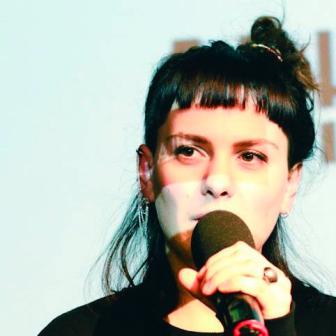Poet
Galina Rymboe

Galina Rymboe
(Russian Federation, 1990)
Biography
Galina Rymbu (1990) is a poet, feminist, and activist. She has published three collections: Передвижное пространство переворота (Moving Space of the Revolution, 2014), Время земли (Time of the Earth, 2018), and Жизнь в пространстве (Life in Space, 2018). Her poetry has won prizes in Russia and beyond, and an English translation of her work so far is due out this year from Ugly Duckling Press. Considering where she is from, the fact that she and her poetry are now travelling around the world still seems unlikely, as she said in an interview at Brussels’ BOZAR. Born in the industrial Siberian city of Omsk to a family of laborers during the twilight of the Soviet Union, everyone around her worked in the highly toxic factories. A different life, let alone life as a poet, seemed inconceivable.
Her poetry depicts a kind of life that transcends the repetitive and violent exclusion, exhaustion, and exploitation of bodies and worlds that define our society. Rymbu’s Time of the Earth can thus also be read as a utopian gesture. The title not only refers to the Anthropocene age, as geologists and climate scientist call the current period, in which humans, after centuries of exhausting our natural resources, have irrevocably marked the very soil; it also forces us to re-examine our relationships to the ground beneath us and to each other. The Anthropocene age is often described as a great acceleration, an era in which the long timespans of geology catch up with humanity’s brief spell and dethrone us as the center of our universe. What Rymbu’s work does is just a little different, as she tells the story overshadowed by that of the Anthropocene: she does not focus on humankind as conqueror, but on all those, not even just humans, who have been trampled and abandoned by the inexorable march of progress. Her poetry foregrounds unfamiliar rhythms that are slow, polyphonic, beyond the human; these very rhythms, Rymbu’s glorious poems suggest, can sensitize the reader to a life lived amidst the ruins of what we once called civilization.
© Frank Keizer (Translated by Florian Duijsens)
Poems
Poems of Galina Rymboe
Sponsors
























